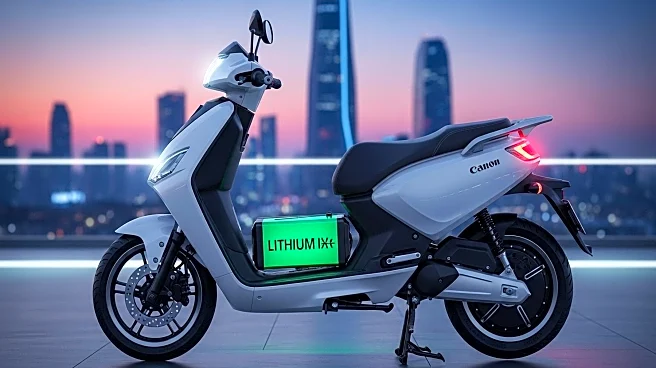What is the story about?
What's Happening?
The U.S. Consumer Product Safety Commission (CPSC) is progressing with a proposed safety standard for lithium-ion batteries used in micromobility products. Acting Chairman Peter Feldman announced advancements of critical safety standards to the Office of Information and Regulatory Affairs, including the draft rule on these batteries. The rule aims to address risks such as electric shock, fires, explosions, and smoke inhalation associated with lithium-ion batteries in micromobility devices. The draft proposes modifications to existing voluntary standards, including UL 2849-20, UL 2272-24, and UL 2271-23, which cover safety for electrical systems in eBikes, personal e-mobility devices, and light electric vehicles. If enacted, the rule would impose performance requirements on original electrical systems and replaceable battery packs in various micromobility products.
Why It's Important?
The proposed rule is significant as it seeks to enhance consumer safety in the rapidly growing micromobility sector, which includes eBikes, eScooters, and other electric vehicles. These products have become increasingly popular for urban transportation, but they pose safety risks due to the potential for battery-related incidents. Establishing a safety standard could mitigate these risks, protecting consumers and potentially reducing liability for manufacturers. The rule reflects a broader regulatory focus on ensuring safe use of emerging technologies, which could influence industry practices and consumer confidence in micromobility products.
What's Next?
The CPSC's action indicates that federal regulations for micromobility products are a priority and may soon be implemented. If the 'Setting Consumer Standards for Lithium-Ion Batteries Act' is passed by the Senate, the CPSC would have 180 days to establish micromobility regulations. This could lead to increased scrutiny and compliance requirements for manufacturers, impacting product design and market strategies. Stakeholders, including manufacturers and consumer safety advocates, are likely to engage in discussions to shape the final standards.
Beyond the Headlines
The development of safety standards for lithium-ion batteries in micromobility products could have broader implications for the regulation of other battery-powered devices. As the use of rechargeable batteries expands across various sectors, similar safety concerns may arise, prompting further regulatory actions. This could lead to a more comprehensive approach to battery safety, influencing innovation and consumer trust in battery-powered technologies.
















